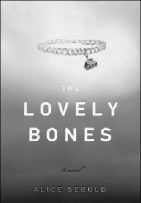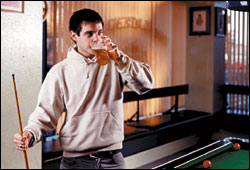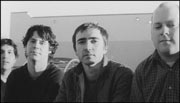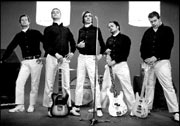THE LOVELY BONES
by Alice Sebold (Little, Brown and Co., $21.95)
Susie Salmon isn’t much different than a million other 14-year-old girls growing up in the suburban America of the 1970s. A contradictory bundle of confidence and insecurity, she likes bike rides and ladybugs, lives in yellow bell-bottoms and a David Cassidy button, and is just plunging into the unfamiliar waters of her first Big Crush. Susie’s pretty typical, actually, except for one thing: She’s dead.
As of Dec. 6, 1973, when a squirrelly, mysterious neighbor in their cozy Midwest town lures her into a field behind the local junior high, then brutally rapes and murders her, she exists very much in spirit, but her body is gone (cut into pieces and left at the bottom of a garbage sinkhole). From her new vantage point in heaven, Susie looks down on the aftermath of her disappearance. At first, because her killer is an expert at covering his tracks, no evidence is found; only the discovery of a lone elbow bone finally confirms her family’s worst fears.
Sebold, whose previous work, Lucky, was a highly praised memoir of her own vicious college rape, has taken on in Bones a theme that could easily have turned to the maudlin or grotesque. Instead, the book is a moving treatment of grieving and the strength of romantic and familial ties, with hardly a trace of soggy New Age- iness. The heaven Susie inhabits isn’t a cotton-ball cloud of harps and halos, but a more amorphous place where material wishes are easily granted but emotional ones are not.
There’s plenty to do in heaven—if she wishes it, fields of wildflowers filled with cavorting dogs will appear almost instantly for her pleasure—but Susie spends most of her time in the gazebo she’s conjured up for herself, dwelling on the past as well as an earthly present and future that no longer include her. She creates and goes every day to a replication of her hometown high school, which looks just the same, only without the pesky teachers and math classes—a benign place where “the boys did not pinch our backsides or tell us we smelled; our textbooks were Seventeen and Glamour and Vogue.”
With her new omniscient powers, Susie is able to visit earth, if not physically. She swoops in on her father, who sits in his study with his toy ships in bottles, quietly falling apart. She observes her mother pull away from her husband and their remaining children, then turn to an adulterous affair for cold comfort. She follows her sister, Lindsey, as she struggles under the weight of a million curious eyes, forever the look-alike the dead girl left behind. Susie even tracks the movements of her killer, Mr. Harvey, and learns just how deep his pathology runs.
Over the course of the next 10 years, Susie is there for every kiss and every betrayal, only occasionally making her presence known—a shadow glimpsed in the corner of a loved one’s eye, a bright flash in a shard of glass. She is a silent witness to the loss of her sister’s virginity and to the manic suspicions her father develops of Mr. Harvey. She watches as Ray, the bestower of her first and only kiss, grows from a gawky outsider to a handsome, assured med student, and as her baby brother leaves behind his sweet boyhood for a pudgy, angry adolescence.
Sebold stays largely true to the voice of a 14-year-old, and her narration is neither a hindrance nor a gimmick— if Susie occasionally uses unlikely 10- dollar words like “obsequious,” we forgive her. Her voice is sad, practical, thoughtful, amused, frustrated, and even hopeful; it’s the voice of a human being, and her clear-eyed view of both the awkward struggles and small triumphs of adolescence, and the much more convoluted minefields of adulthood, is perceptive without being annoyingly precocious.
It’s not a book with a message per se, though Bones is indeed lovely—remarkably uplifting and (excuse the Oprah adjectives) life affirming—especially for a work that hinges on such a brutal, ugly crime. Late in the book Susie looks down on her broken-but-mending family, gathered together a decade after her death, and observes: “These were the lovely bones that had grown around my absence: the connections—sometimes tenuous, sometimes made at great cost, but often magnificent—that happened after I was gone. And I began to see things in a way that let me hold the world without me in it.”
The hardest thing about Bones is leaving Susie’s world. You might wish, like her, that you could stay longer.
Alice Sebold reads and signs The Lovely Bones 7:30 p.m. Wed., July 17 at Elliott Bay Book Co.









